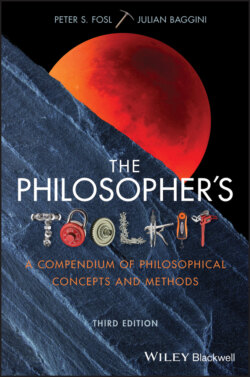Читать книгу The Philosopher's Toolkit - Julian Baggini, Julian Baggini - Страница 75
A rule of thumb
ОглавлениеAs a general rule, it’s better if your definition corresponds as closely as possible to the way in which the term is ordinarily used in the kinds of debates to which your claims are pertinent. There will be, however, occasions where it is appropriate, even necessary, to coin special uses through what philosophers call stimulative definition. This would be the case where the current lexicon is not able to make distinctions that you think are philosophically important. For example, we do not have a term in ordinary language that describes a memory that is not necessarily a memory of something the person having it has experienced. Such a thing would occur, for example, if I could somehow share your memories: I would have a memory‐type experience, but this would not be of something that I had actually experienced. To call this a memory would be misleading. For this reason, philosophers have coined the special term ‘quasi‐memory’ (or ‘q‐memory’) to refer to these hypothetical memory‐like experiences.
